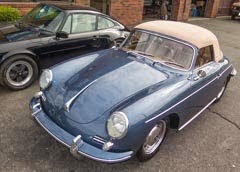Motor oil – what to use, when, and why - is a surprisingly
contentious topic, especially when it comes to collector cars. I’ve seen so-called gentlemen get into
fistfights over the stuff at more than one holiday party, when the effects of
Mobil Synthetic Blend and Smirnoff vodka prove more than one could handle.
As New Years approaches I thought I’d share our philosophy
at Robison Service, particularly as regards collector cars.
- We should begin by looking at what we want the oil to do, in a vintage vehicle
- We want an oil that has high natural strength – otherwise referred to as film strength or barrier strength. This is the oil’s ability to prevent metal on metal wear in the moments before the oil pump begins delivering pressurized oil to the bearings.
- We want an oil that’s fairly thick at running temperature, because older engines have sloppier clearances, but not so thick as to be a drag on performance
- We want an oil with zinc additive for the metallurgy of vintage motors
- We want an oil with strong detergents to clean what are often dirty old motors
- We want an oil that’s free of waxes and compounds that form sludge in long storage and short cycle use.
There are not many oils marketed for this purpose. The one we are using more and more is Castrol
Syntec Edge 5-50 Classic Car Formula.
It’s replaced the older Castol GTX for vintage cars. Mobil – to the best of my knowledge – does
not have a comparable oil.
Readers of my columns know I’m a big believer in synthetic
oils. Their superior strength and durability
are beyond dispute. Some vintage car
owners argue that durability does not matter in a car that’s driven 1,000 miles
a year with annual oil changes, but the other features of synthetics DO matter.
Synthetic oil is thinner when cold and stays thicker when
hot. That means a synthetic 5-50 is more
pumpable than a conventional 20-50 on cold start, yet is actually thicker at
200 degrees when the motor is running.
The fact that synthetics are thinner when cold means the oil
pump will begin circulating oil faster.
Engineers suggest that most wear happens in the seconds before the oil
system gets up to pressure so that’s a vital benefit.
Older engines need a different set of additives than those
optimized for new cars. Syntec Classic
is one of the few oils to offer vintage-tailored additives.
There are so many different grades of oil now, for so many
purposes, that it’s difficult to make a choice for these older vehicles that
predate the modern specifications. We do
our best, but we recognize there may be more than one answer. The main thing we want to avoid is wrong
choices that can damage engines.
What oil are you using in your collector car, and why?



























No comments:
Post a Comment